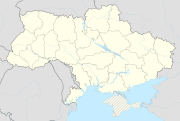Wesselyj Kut (Arzys)
| Vesselyj Kut | ||
| Веселий Кут | ||

|
|
|
| Basic data | ||
|---|---|---|
| Oblast : | Odessa Oblast | |
| Rajon : | Arzys district | |
| Height : | 27 m | |
| Area : | 2.36 km² | |
| Residents : | 1,797 (2004) | |
| Population density : | 761 inhabitants per km² | |
| Postcodes : | 68420 | |
| Area code : | +380 4845 | |
| Geographic location : | 46 ° 3 ' N , 29 ° 17' E | |
| KOATUU : | 5120480501 | |
| Administrative structure : | 2 villages | |
| Mayor : | Ivan Shtyrbulov | |
| Address: | вул. Кутузова 68420 с. Веселий Кут |
|
| Website : | https://rada.info/rada/04377351/ | |
| Statistical information | ||
|
|
||
Wesselyj Kut ( Ukrainian Веселий Кут ; Russian Весёлый Кут Wesjoly Kut , German and Romanian Paris ) is a village in Bessarabia in today's Ukraine (Odessa Oblast).
The village, founded by German emigrants in 1816, belonged to the territory of the Russian Empire at that time . Today the village is located in the Odessa Oblast , Rajon Arzys and together with the neighboring village Roschtscha (Ukrainian Роща , formerly German "New Paris") forms a district council .
history
The place lies in the historical landscape of Bessarabia . The area of Bessarabia came in 1812 in the Treaty of Bucharest from the Ottoman vassal state of Moldova together with the Budschak to the Russian Empire . The new acquisition was treated as a colonization area and initially assigned to the Governor General of New Russia . In a manifesto of 1813, Tsar Alexander I called German colonists into the country to colonize the newly won steppe areas in New Russia. Here in 1816 German emigrants founded the village number 10 , which was initially called Alecksüßwerth. The place belongs to the 24 Bessarabian German mother colonies. They were established by immigrants, while daughter colonies were later established by residents of the mother colonies. Most of the founders of Paris came from a village in Poland on the Prosna tributary of the Warta . They had emigrated from Mecklenburg and Pomerania at the end of the 18th century and reclaimed the swampy land in Poland. When they saw themselves cheated out of their wages by a landowner, they followed the call of Tsar Alexander I and emigrated to Bessarabia.
The place, initially called Alecksüßwerth, was later renamed by the Russian colonial administration in Paris to commemorate the triumph of the allies over Napoleon I in Paris in 1814 as part of the Patriotic War .
village life
Paris was one of the few German communities in Bessarabia where Low German was spoken. The inhabitants of Paris lived from agriculture and viticulture. In addition, the fork-making trade of wooden forks for use in the grain harvest flourished. In the village, the German colonists built a spacious church with 900 seats for the modest income. The Bessarabian German settlers belonged to the Lutheran denomination in what was then the Akkerman district within the Bessarabia governorate .
After the Soviet occupation of Bessarabia in the summer of 1940, covered by the Hitler-Stalin pact , the approximately 1,600 German Bessarabia local residents joined in the fall of 1940, the resettlement into the German Empire under the slogan Heim ins Reich on. Since then, mainly residents of Russian origin have lived in the place.

